| SHADOWS ON THE WALL | REVIEWS | NEWS | FESTIVAL | AWARDS | Q&A | ABOUT | TALKBACK | |||||
 Shadows off the beaten path Shadows off the beaten pathIndies, foreign, docs and shorts...
On this page:
NAFI'S FATHER |
SONG WITHOUT A NAME |
THIS IS CRISTINA
| |||||
| See also: SHADOWS FILM FESTIVAL | Last update 7.Nov.20 | |||||
|
Nafi’s Father Baamum Nafi Review by Rich Cline | 
| |||||
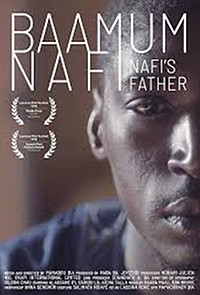 dir-scr Mamadou Dia prd Maba Ba, Mamadou Dia with Alassane Sy, Saikou Lo, Aicha Talla, Penda Daly Sy, Alassane Ndoye, Abou Yerim Ndiaye, Coumba Dia Sall, Donde Kasse, Ben Mahmoud Mbow, Omar Fall, Coumba Diallo, Ablaye Dicko release UK Nov.20 rff 19/Senegal 1h47  Is it streaming? |
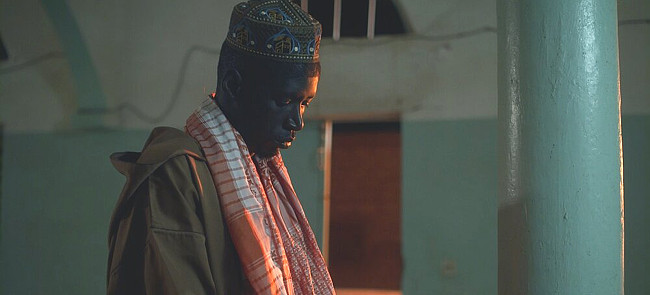 A sharply well-observed slice-of-life drama from rural Senegal, this film beautifully captures the impact of religion and local traditions on various generations. Filmmaker Mamadou Dia sets up a powerful clash between brothers that explores the corrupting influence of both faith and money at all levels of politics. While the pace is slow, the film is beautifully shot to capture fascinating details in the setting, the narrative and the characters. In a small village, sensitive religious leader Tierno (Alassane Sy) is taken aback when his brother, radical imam Ousmane (Lo), turns up announcing that his son Tokara (Ndoye) will marry Tierno's teen daughter Nafi (Talla). Tierno quickly rejects this idea, but Ousmane has support from a wealthy fundamentalist sheikh, so is buying friends by throwing cash around. And the feisty Nafi believes marrying Tokara will allow her to move to the city and attend university. Desperate to stop fanaticism from getting a toehold here, Tierno knows that this is a battle for the village's soul. While arguing that Nafi is too young, Tierno's bigger worry is that she will be brainwashed into joining this extremist faction. He knows the sheikh is training terrorists, but his simple faith misses how fanatical ideas appeal to the people, or how his traditionalist beliefs are forcing his daughter to become secretive. The growing tension between these brothers feels Shakespearean, so even if the film remains skilfully understated, there's a sense that it's heading to tragedy. The brothers offer an intriguing contrast: Sy's Tierno is quietly confident, stubborn and sensitive, while Lo's Ousmane is more charismatic and hungry for power, using religion to control people. Tierno's calmly rigid integrity has an edge, refusing to bend to those he sees as immoral and violent. But Ousmane is just as determined. As Nafi, Talla has terrific presence, noting that Tokara is too kind, like her father. And we can see where she gets it, as Penda Daly Sy plays her mother with the same self-assurance. The film is packed with amazing sequences, such as when Ousmane undermines the mayor's authority by giving seeds to the farmers, while enforcing fundamentalist views like telling women to wear hijabs. As his drive to power becomes more aggressive, the film begins to shift into a dramatic thriller. Dia's approach to this story is vividly specific to a time and place, and yet its deeper themes have a much wider resonance, exploring hard truths about human nature that haunt us no matter where we live.
| ||||
|
Song Without a Name Canción Sin Nombre Review by Rich Cline |  MUST
MUST  SEE SEE
| |||||
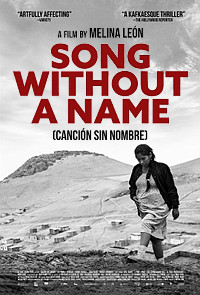 dir Melina Leon scr Melina Leon, Michael J White prd Inti Briones, Melina Leon, Michael J White with Pamela Mendoza Arpi, Tommy Parraga, Lucio Rojas, Maykol Hernandez, Lidia Quispe, Ruth Armas, Gabriela Velasquez, Lourdes Villareal, Jhazmin Mamani, Fredy Monteza, Melvin Quijada, Jhony Ruiz release Per Aug.19 lff, US Oct.19 ciff, UK 30.Oct.20 19/Peru 1h37 CANNES FILM FEST Is it streaming? |
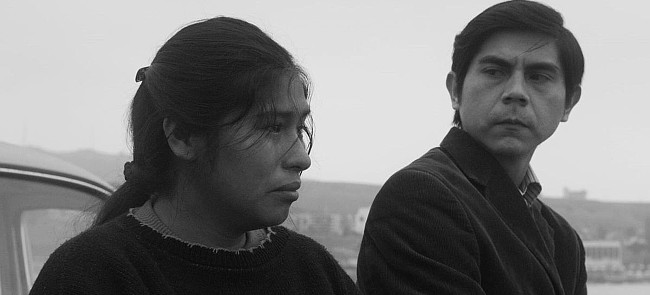 Based on a true story, this artful drama from Peru is set at a time of economic turbulence and threats of violent terrorism. Shot vintage style, in black-and-white Academy ratio with blurred edges, the film is instantly timeless in the way it captures the indigenous Quechua culture. With her first feature, filmmaker Melina Leon creates a mesmerising experience, revealing the story through skilful visual touches and heart-stopping emotions. In rural Peru in 1988, 20-year-old Georgina (Mendoza Arpi) and her husband Leo (Rojas) are expecting a child. Answering an ad for free pregnancy care, Georgina travels to a clinic in Lima and gives birth. But it's a scam, and her daughter is stolen. The police are no help, because Georgina and Leo don't have the right documents. Meanwhile, newspaper journalist Pedro (Parraga) knows he'll never get used to covering horrific terrorist attacks, so when he hears about Georgina's plight he takes up her cause. And he meets other young women with the same story. The film's gentle tone allows the story to unfold with quiet authenticity, augmented by Inti Briones' gorgeously silvery cinematography and an exquisitely delicate score by Pauchi Sasaki. There's a crisp contrast between Georgina's boxy home on a misty mountain slope, the town where she sells potatoes on the street and the coldly unforgiving capital city. And as the story quietly spins into a provocative investigative thriller, it's horrifying to see powerless indigenous workers be ignored by officials and harassed by police. Mendoza Arpi's performance is stunning, taking this thoughtful young woman into a wrenching situation in a way that makes the audience feel each flicker of emotion. Her desperation is viscerally compelling, as is her numbed reaction when someone finally shows her some compassion. Opposite her, Parraga has a remarkable stillness, observing details and getting involved in Georgina's story. He also makes an unexpected romantic connection with colourful neighbour Isa (Hernandez), who's acting in a local production of The Glass Menagerie. The script is packed with subtle comments on Peru's political situation at the time, which echoes through the stark divisions between classes and ethnic groups. Distracted by terrorism, politicians call kidnappings "pitiful, but not surprising", and Pedro understands that Georgina's baby has probably already been sold abroad. It's inspiring to see him offer Georgina some dignity as he works through a Kafkaesque system to find the truth. And his personal journey is just as involving.
| ||||
|
This Is Cristina Ella Es Cristina Review by Rich Cline | 
| |||||
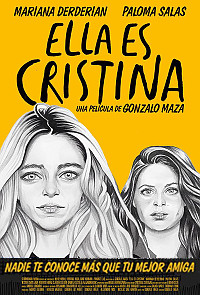 dir-scr Gonzalo Maza prd Horacio Valdivia, Andres Valdivia, Gonzalo Maza, Carmen Luz Parot, Alejandro Wise, Nicolas San Martin with Mariana Derderiaan, Paloma Salas, Roberto Farias, Nestor Cantillana, Daniela Castillo, Claudia Celedon, Alejandro Goic, Bernardo Quesney, Paola Lattus, Omar Moran, Lucas Balmaceda, Sebastian Lelio release Chl 13.Jun.19, UK Oct.20 rff 19/Chile 1h22  Is it streaming? |
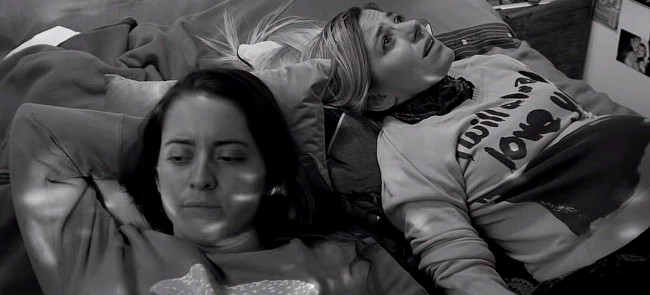 With a series of seemingly random scenes shot in a striking monochrome, this clever Chilean comedy-drama traces the rollercoaster trajectory of a friendship between two women who seem unwilling to grow up and take responsibility for their lives. For his directing debut, gifted writer-producer Gonzalo Meza (A Fantastic Woman) cleverly weaves together a coming-of-age story that hinges on this connection. It feels crisp and light, but carries a strong kick. At 30, Cristina (Derderiaan) and her childhood buddy Susana (Salas) still act like teenagers. A talented cartoonist, Cristina is close to her adorable ex-husband Ruben (Cantillana), while Susana breaks up with her boyfriend (Quensey) because he's too nice. She also sabotages any chance of Cristina and Ruben getting back together, which puts their friendship on the rocks. Cristina then attends a writing class to add depth to her drawings, launching into a relationship with mercurial teacher Romulo (Farias). But what will it take for her and Susana to find their way back to each other? As the story meanders along, the dialog casually reveals big events from their past. Together and apart, Cristina and Susana find themselves in a variety of situations that are wildly comical but played with a straight face, as if they're unable to see the gravity of their life choices, thinking that throwing a party or adopting a dog will solve their problems. For her part, Susana is also dealing with distinct issues involving her long-divorced parents (Celedon and Goic). Both Derderiaan and Salas are superb at remaining understated even amid some wild plot turns. Neither Cristina nor Susana has developed very critical thinking, so they seem like easy prey to their most random whims and the worst chat-up lines imaginable. That the actors keep them so likeable is no mean feat. The surrounding characters have similar complexity, often both loving and nasty at the same time, complicated by personal and professional rivalries. Such a loose structure allows barbed points to catch the audience off guard. It's easy to sympathise with people who just want their lives to be simple and easy, then feel helpless as everything seems to spiral out of control. Each of the people they come in contact with teaches them a tough lesson about humanity, and by the end it's clear that they're perhaps strong enough to face the world on their own. As long as they always have each others' backs.
| ||||

See also: SHADOWS FILM FESTIVAL © 2020 by Rich Cline, Shadows
on the Wall
HOME | REVIEWS | NEWS | FESTIVAL | AWARDS
| Q&A | ABOUT | TALKBACK | | ||||
